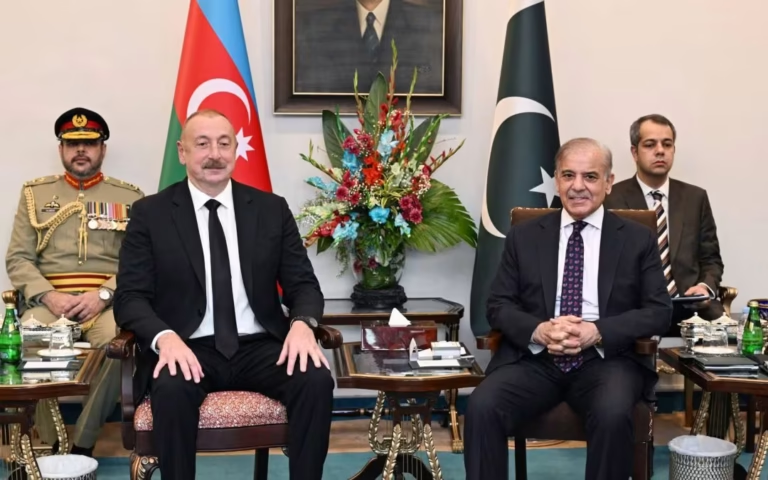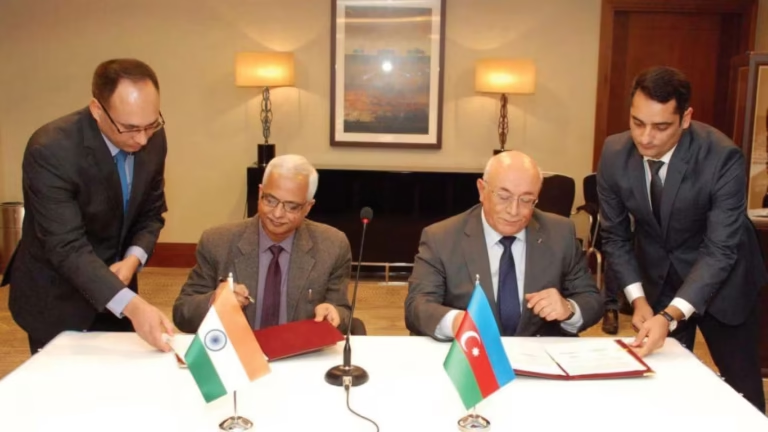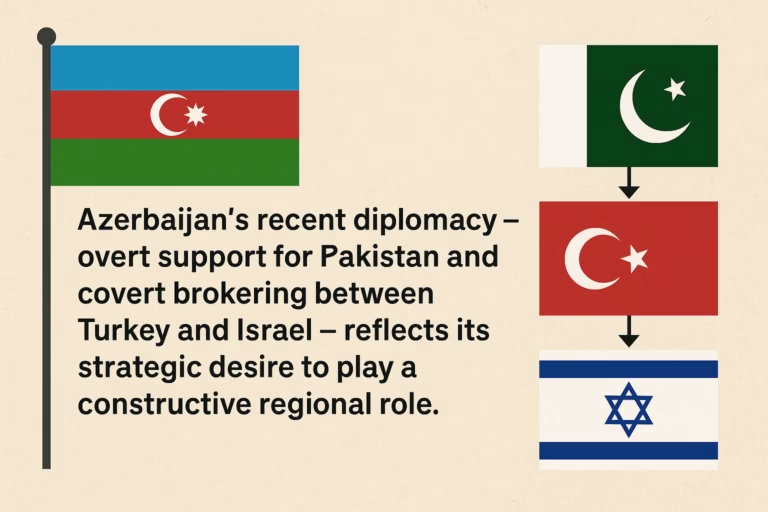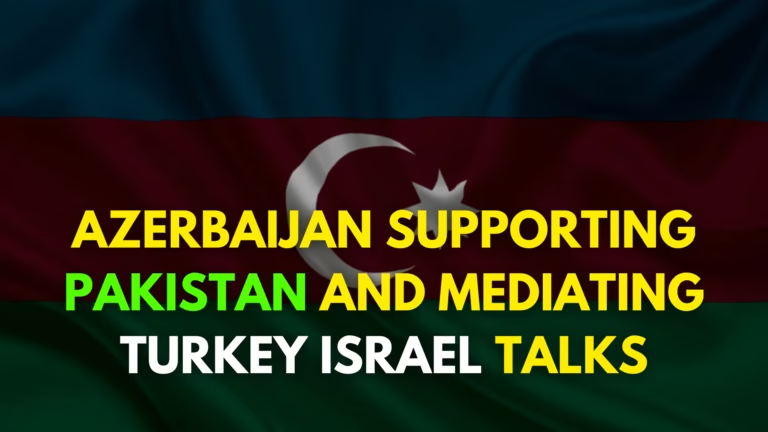Introduction
In May 2025, Azerbaijan took two contrasting diplomatic initiatives on the international stage. As a conflict between nuclear-armed neighbors India and Pakistan erupted, Baku publicly voiced support for Islamabad.
Simultaneously, Azerbaijan quietly facilitated dialogue between two erstwhile allies, Turkey and Israel, working to normalize their strained ties. These moves underscore Azerbaijan’s evolving role as both a regional partner and a behind-the-scenes mediator.
Historical Context: Azerbaijan’s Ties with Pakistan, India, Turkey, and Israel
Azerbaijan’s foreign relations are shaped by shared history, cultural affinities, and strategic interests. It has long enjoyed fraternal bonds with the following countries.
Turkey: Turkey and Azerbaijan famously describe their link as “one nation, two states,” reflecting deep ethnic and political ties. Turkey was the first country to recognize Azerbaijan’s independence in 1991, and the two have closely aligned on security and economic projects ever since.

Pakistan: Pakistan was also an early supporter, being the second country, after Turkey, to recognize Azerbaijan in 1991. Over the years, Islamabad and Baku have “consistently stood by one another” on key issues – Pakistan backed Azerbaijan’s territorial integrity during the Nagorno-Karabakh conflict, while Azerbaijan has openly supported Pakistan on Kashmir.

India: Relations with India have been more pragmatic. India and Azerbaijan have cooperated economically—Azerbaijan was for many years New Delhi’s major trade partner in the South Caucasus. Both governments have continued to engage on trade and energy.

Israel: Azerbaijan’s relationship with Israel is another strategic partnership. The two countries established relations soon after 1991. Israel has become a key defense partner and energy customer for Baku: roughly half of Israel’s imported oil comes from Azerbaijan, and Israel is a major arms supplier to Azerbaijan. This economic and security cooperation has given Baku credibility with Israeli officials.

These overlapping alliances – close ties with both Turkey and Israel, and strong fraternity with Pakistan – set the stage for Azerbaijan’s recent diplomatic balancing act.
Azerbaijan’s Support for Pakistan in the India–Pakistan Crisis
One of the deadliest encounters between India and Pakistan in recent memory occurred during the recent conflict. Throughout this tense period, Azerbaijan took a clear stance in support of Pakistan.
On May 1, 2025, Azerbaijan’s Foreign Ministry issued a public statement expressing “concern” over the Pahalgam attack and urging restraint from both sides. The official release called for “constructive dialogue to deescalate current tensions” and even recommended an “open and transparent international investigation” into the incident. This early intervention by Baku signaled a preference for diplomacy.
When India carried out strikes on Pakistan on May 7–8, Azerbaijan voiced strong solidarity with Islamabad. According to Anadolu Agency, on May 8 Azerbaijani Foreign Minister Jeyhun Bayramov phoned Pakistan’s Foreign Minister Ishaq Dar. Bayramov “expressed his condolences for the civilian casualties and reaffirmed Azerbaijan’s solidarity with the people of Pakistan”.
He explicitly condemned the attacks and “emphasized the importance of avoiding further escalation, urging all parties to pursue a resolution through diplomatic channels.”
On June 4, 2025, Speaker of the Azerbaijani Parliament Sahiba Gafarova met Pakistan’s ambassador and stated that Baku had been “monitoring the recent tensions between Pakistan and India closely and with great concern.” She announced that Azerbaijan “openly demonstrates her solidarity with Pakistan” during these challenging times. Gafarova added that Azerbaijan “supports resolving the conflict through dialogue and peaceful means, following international law principles and norms, as well as UN Security Council resolutions”.
In sum, Azerbaijan’s response to the May 2025 crisis was to side firmly with Pakistan on the diplomatic front.
Facilitating Talks between Turkey and Israel
At roughly the same time, Azerbaijan has been quietly active behind the scenes in mending the recently frayed relationship between Turkey and Israel.
Ties between Ankara and Jerusalem hit a low after Israel’s war with Hamas in Gaza in 2023, and there were fears of an outright confrontation in northern Syria, where Turkish forces have increased their presence. Leveraging its good relations with both countries, Baku has offered itself as a neutral convenor.
According to multiple reports, Turkish and Israeli officials have held technical talks in Baku aimed at preventing military clashes in Syria. This initiative was confirmed by Turkish officials, who said the talks marked the beginning of efforts “to establish a channel to avoid potential clashes or misunderstandings over military operations”.
Azerbaijan’s own diplomats confirmed their facilitation role. Hikmet Hajiyev, a senior foreign policy adviser to President Ilham Aliyev, told Turkish media that Baku had “hosted more than three rounds of talks” between Ankara and Tel Aviv.
President Aliyev himself has publicly acknowledged Baku’s mediating role. Speaking at a policy forum in Baku, he expressed hope that dialogue would lead to normalization: “We hope the process will lead to normalization,” he said. He recognized the tensions and “high level of mistrust” between Turkey and Israel but insisted “there is still common ground and areas of mutual interest.”
Aliyev pledged that “the process…should not stop, and Azerbaijan is doing everything in its position to facilitate” it. He added that “conflicts between allies affect… their partners and the region as a whole,” underscoring why Baku supports “continued normalization” and would do “all we can to contribute to that goal”.
These statements highlight the delicate balancing act. Azerbaijan remains a staunch Turkish ally – aligning itself with Ankara’s regional policies (for example, on Syria) – while also maintaining strong ties with Israel. In fact, as noted, Israel depends heavily on Azerbaijani oil and sells weapons to Baku. Because of this dual alignment, Baku is uniquely positioned to carry messages between the two sides.
Conclusion

As President Aliyev and other officials have stressed, Baku is committed to facilitating dialogue and normalization wherever possible.
These initiatives come amid Azerbaijan’s rising influence after its success in the 2023 Karabakh conflict and illustrate how Baku is leveraging its network of relationships – with Turkey, Pakistan, Israel, and others – to shape regional outcomes.

